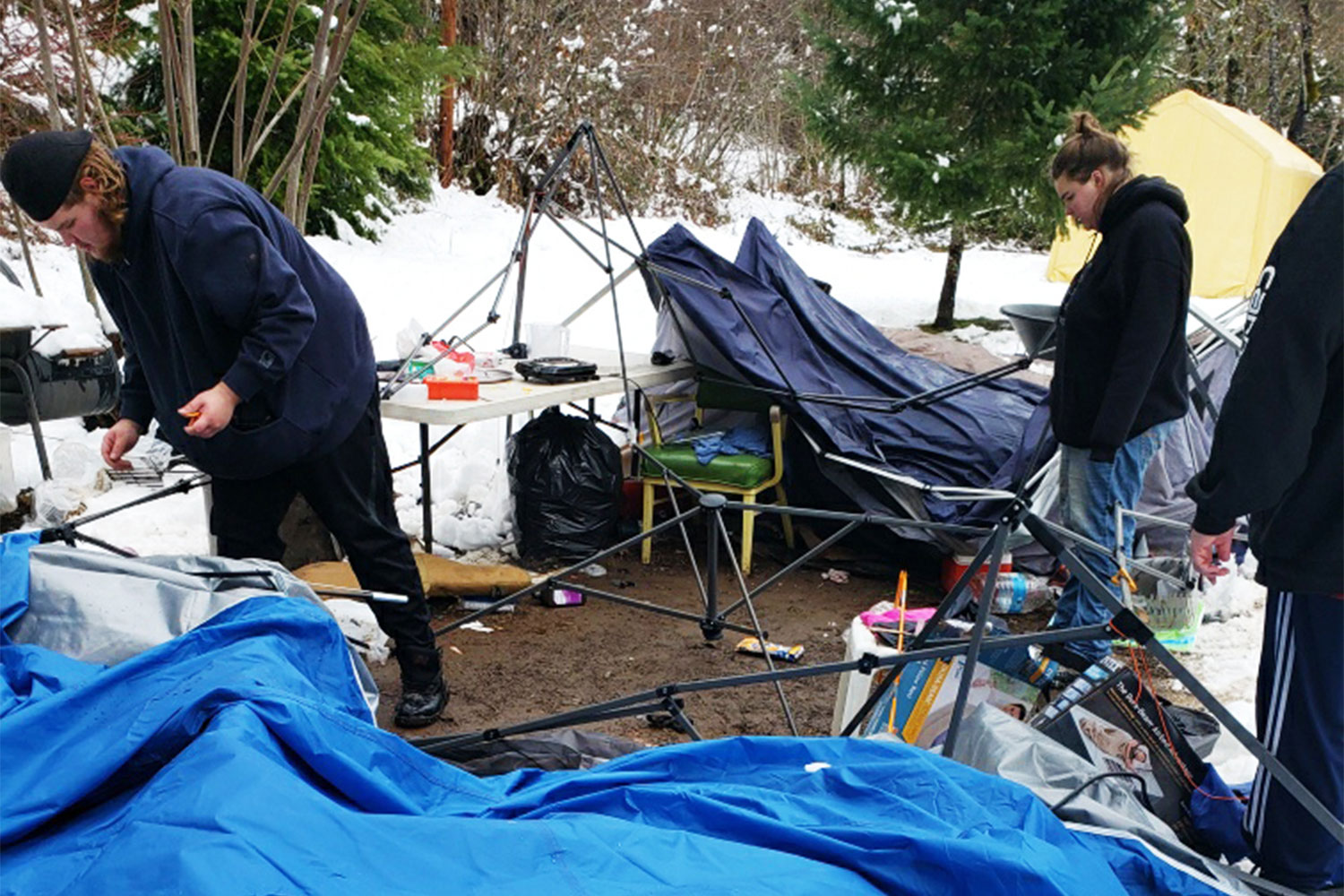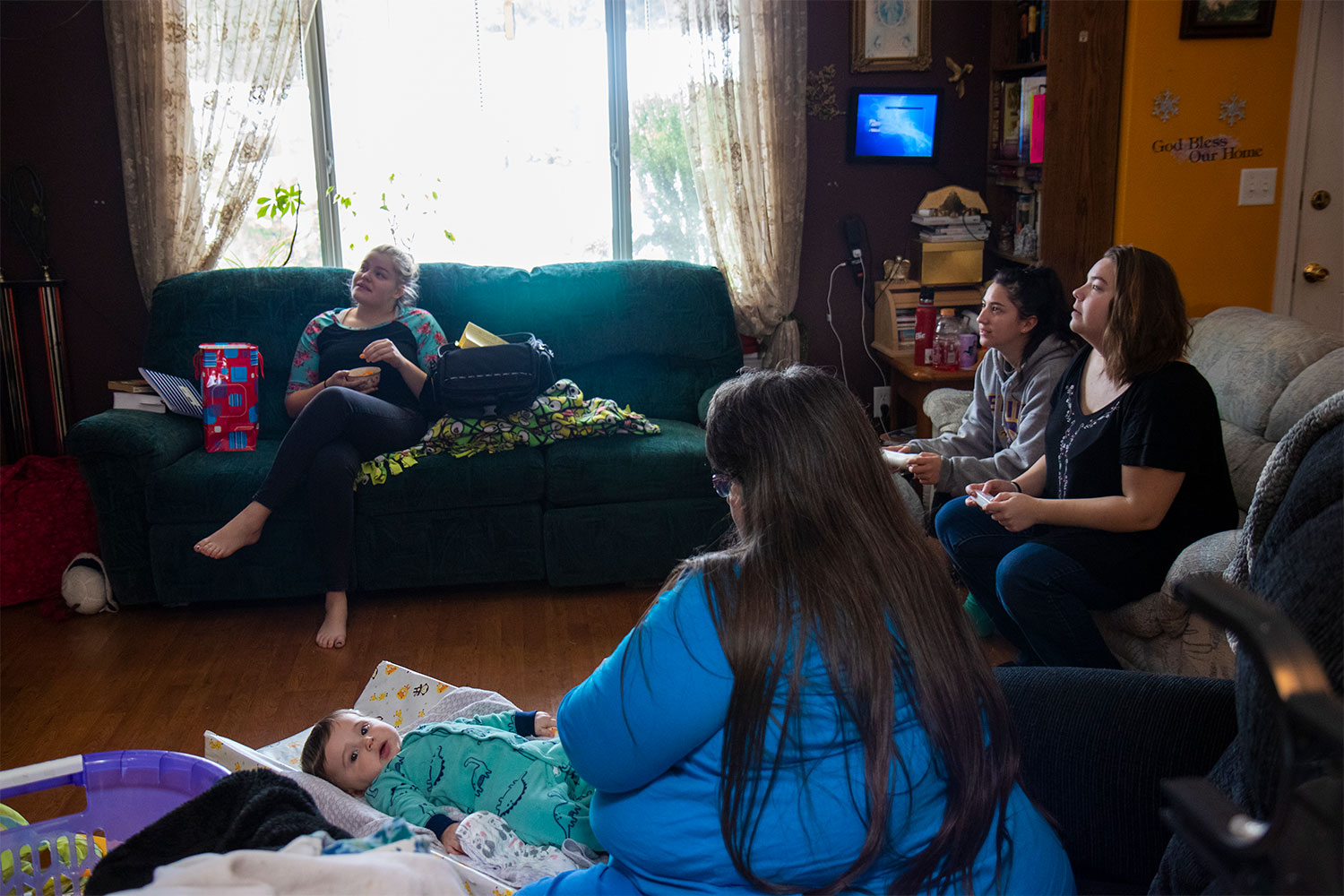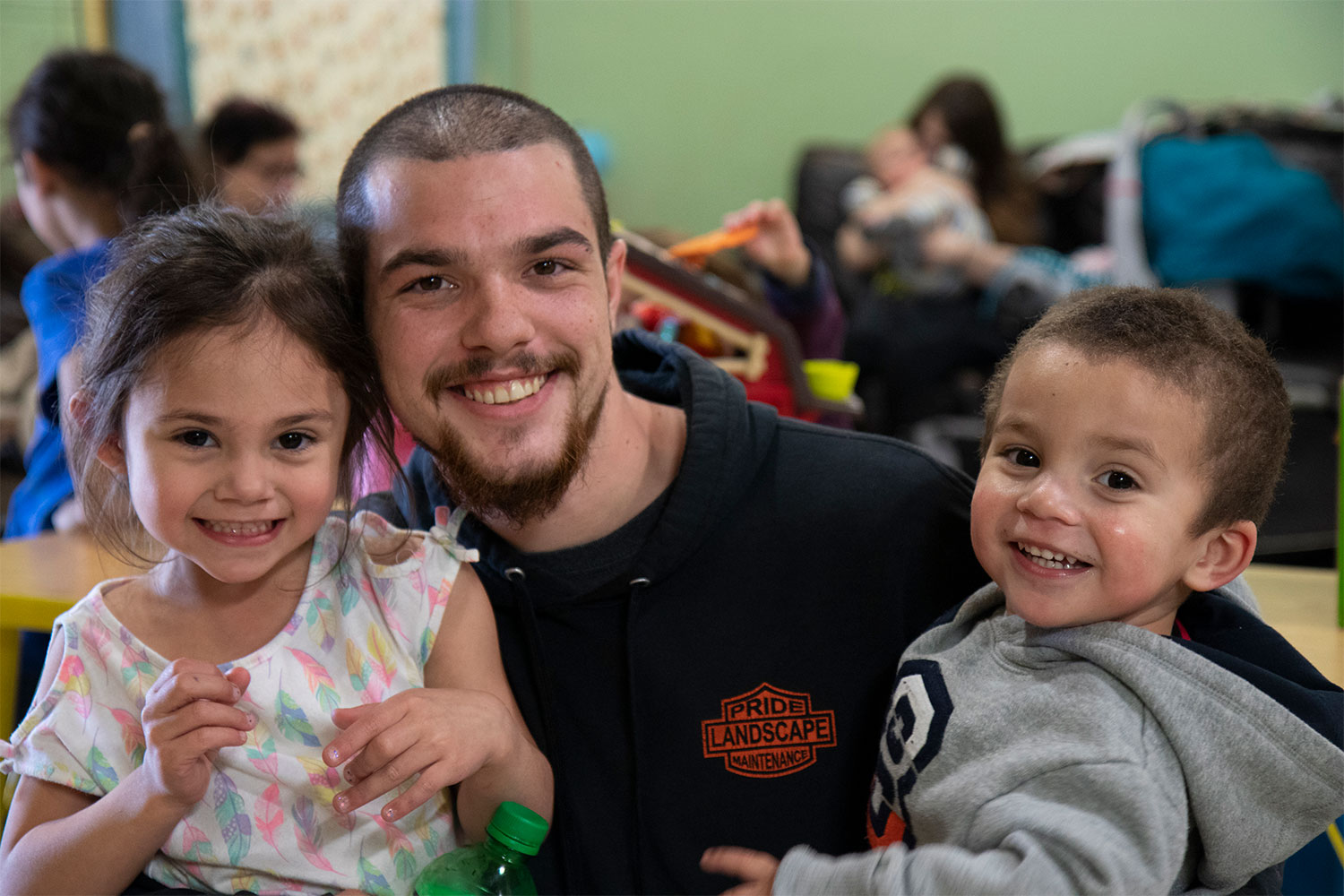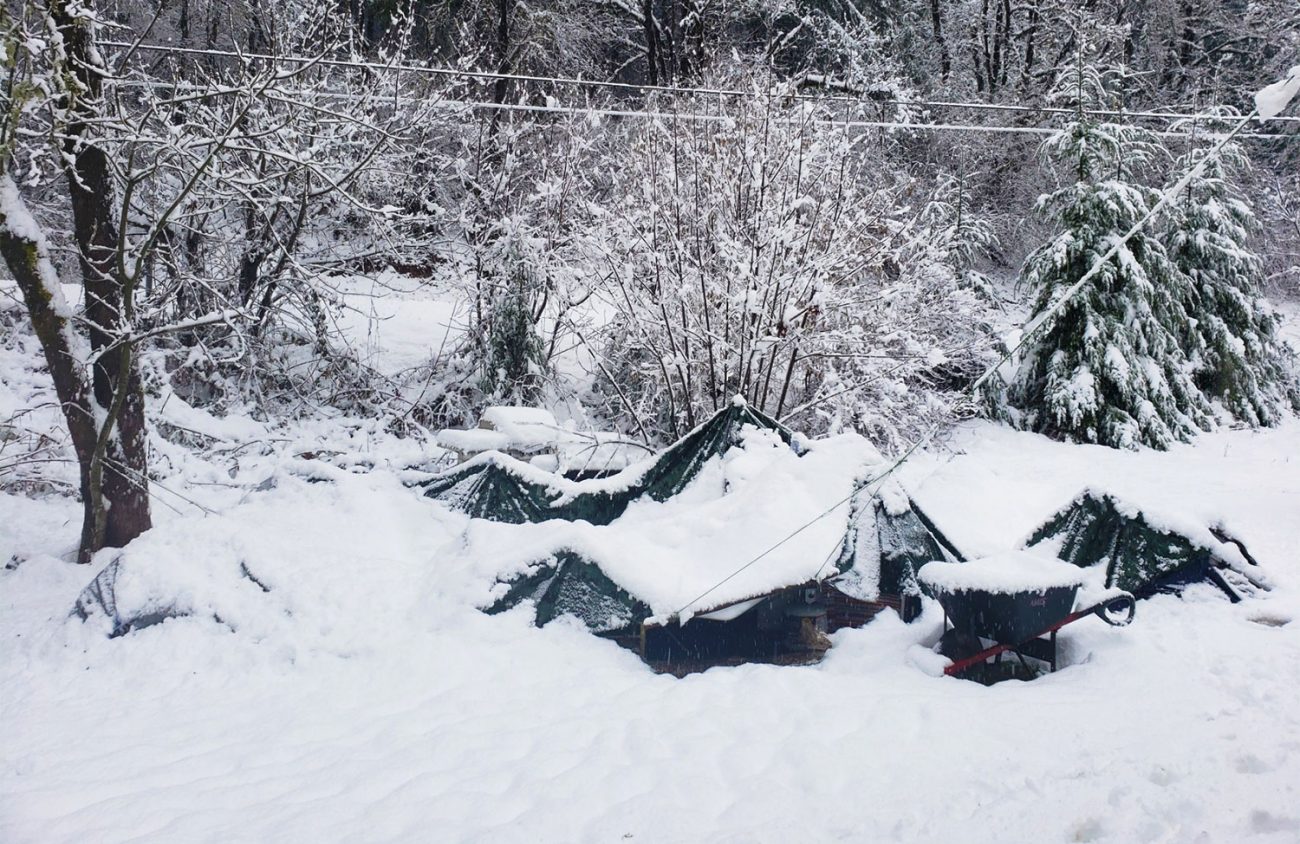Snow pattered on the tent.
“Come on girls, get ready for bed,” Tad Peterson told his daughters.
But 17-year-old Ashley and 14-year-old Trinity couldn’t sleep.
The girls were used to rain. They had spent many cold mornings in damp hoodies waiting for the bus in Noti and many cold nights with puddles in their tent. But snow was different.
“I’m scared,” Trinity whispered.
Peterson called his sons, 22-year-old Damian and 20-year-old Timothy, outside. The boys knocked snow off their tents, but the storm spit white flakes spiraling downward hard and fast.
One bar snapped, then another. The EZ-up tent came down.
Despite the family’s efforts, all of their tents collapsed. The Long Tom River, surging and swelling, was overflowing its banks.
Ashley grabbed her essential possessions — her backpack of textbooks, the phone and tablet she used for school and one blanket.
The late February snowstorm that blanketed the Willamette Valley exacerbated problems for unhoused families like the Petersons and exposed the lack of resources available for homeless single fathers.
Around 2 am Monday, Feb. 25, the Petersons knocked on the door of the woman who had been renting the plot of land beside her house to the family since July. The family moved there after Peterson lost his tech job in Las Vegas and moved his family to Eugene.
Enlarge

Photo by Sierra Dawn McClain
She welcomed the Petersons, in a panic herself as the river covered the land, sweeping toward the house. It was cold and dark inside, save the flicker of candles. The Petersons collapsed on her floor to sleep.
At dawn, the family and their host surveyed the damage.
The Long Tom had just missed the house.
The Petersons were less fortunate. Their possessions were drenched. Their Honda Accord was trapped in a snow bank. And their tents — ruined.
“We lost the one place we had to live,” Ashley says.
Ashley contacted Mandy Burchfield, the director of Campus Life at Elmira High School, a program for at-risk youth.
Soon, Ashley and Trinity had a place to stay for a few days with Burchfield’s siblings and mother, the Robertsons. They played video games, ate warm food and laughed.
Peterson and his sons slept on their landlady’s floor as snow continued to fall.
Enlarge

Photo by Sierra Dawn McClain
The snowstorm left Peterson with $30. He says he had applied for jobs all year without luck. His unemployment and severance pay had run out. SNAP benefits amounted to $1.40 per person per meal, not enough to feed a family of five.
Peterson’s oldest son, Damian, quit college to work as a Grubhub deliverer to help feed his siblings. He wants to give college his best chance — so he plans to wait until he has a house and reliable Wi-Fi before going back.
Damian’s younger brother, Timothy, is looking for work. But he won’t apply for food industry jobs. A teacher once said he would only be good for food services, and he is determined to prove that teacher wrong.
Peterson won’t let his daughters take jobs yet. He insists they focus on school.
“The kids tell me thank you for trying, but I don’t know. This is not what I want for them,” Peterson says.
The children’s drug-addicted mother left the family in 2006. “It’s either me and the kids, or meth,” Peterson had told her. She chose meth.
Peterson has struggled to find support for his family in Eugene. Services exist for mothers with children, but Peterson says he has been turned away as a single father.
Peterson called the Eugene Mission but it was not set up for a homeless father.
“We are absolutely at capacity,” says Beth Sheehan, advancement and communications director at the Mission. “We would love to have a dads and kids program, but we don’t have one yet because we don’t have the resources.”
Sheehan explains that the Mission only uses 10 percent of its acreage and has room for another shelter — but no funding. “It would take a capital campaign with donations of at least $250,000 to open a shelter for fathers with children,” Sheehan says.
Enlarge

Photo by Sierra Dawn McClain
Peterson was not aware of a lesser-known shelter that does help homeless fathers. First Place Family Center, a program of St. Vincent de Paul Society, houses families with at least one child under 18. The center provides basic needs, a half-day preschool and parent programs.
First Place currently has 20 families in its overnight shelter and room for two more, according to Eileen Chanti, the center’s director.
But many more than two families need help. Peterson is one of 215 people in homeless households with children, according to the city of Eugene — 138 sheltered, 113 unsheltered.
Unlike single unhoused individuals who may hold signs on the curb, these families are often invisible — like Peterson’s family. Until the snowfall, only a few people knew they were living in tents.
Chanti explains that families often carry burdens of shame and fear. “Being homeless isn’t a crime,” Chanti says, “but families fear calls to DHS [Department of Human Services], getting torn apart and being taken advantage of because they’re vulnerable.”
These families blend in with the crowd — shopping in supermarkets, going to school and work, walking the streets with everyone else.
Contrary to popular misconception, Chanti says, most have jobs. “Right now, 60 to 80 percent of our families are working — and they’re still homeless.”
Chanti says the system is deficient. “We do not have enough affordable housing in this town. And landlords aren’t willing to rent to unstable families.”
Enlarge

Photo by Sierra Dawn McClain
First Place partners homeless families with housing navigators who vouch for families when negotiating with landlords. Chanti wants to create rent mitigation funds to promise landlords emergency rent coverage.
First Place needs at least two more housing navigators. To expand services, Chanti says the center would need at least $450,000. And to relationally support families in crisis, the center needs more volunteers.
But it will take more than a few homeless shelters to help vulnerable families. It requires community members getting involved. “We have families that are trying to break the cycle of generational poverty,” Chanti says, “and that’s hard to do.”
Chanti says if a family’s support networks are also trapped in systemic poverty, the family might get emotional support and a few dollars, but they won’t get long-term help. Cross-pollination between socioeconomic classes is critical to fracture poverty’s vicious cycle and create a more stable community.
Peterson is one of many homeless parents trying to break poverty’s generational chains. Even with his tents and his life in pieces, Peterson continues to look for work.
The storm that devastated his family may have started a different kind of snowball effect.
No longer invisible, the Petersons have had to rely on others for help — the landlady, Campus Life family, church and school communities. Word got out about their situation.
On the night of Feb. 28, four days after the blizzard, Peterson found a place. It’s a temporary house in Elmira he and his kids will share with another family. St. Vincent de Paul is donating furniture. Peterson got a call from a recruiter for a potential job as a truck driver. It’s not what he wanted — he wants to use his skills as an IT specialist — but if he gets the job, it’ll mean food and warmth and no more tent camping.
The snow is melting. A new month has begun. The Petersons have a hard road ahead and may need help — but it’s a start.
